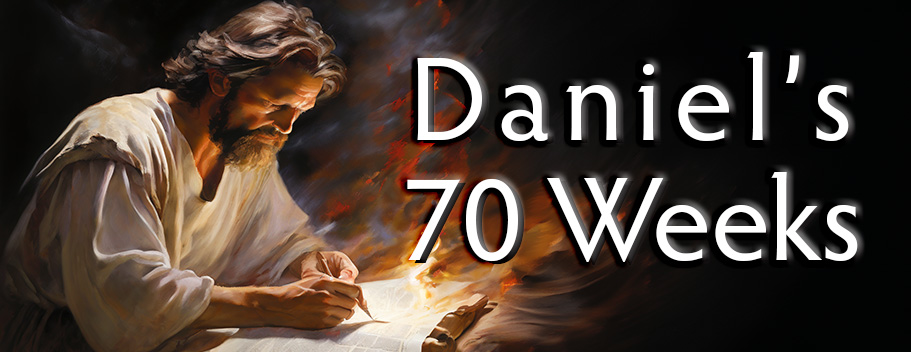In our first blog in this series, we set the stage for Daniel’s amazing prophecy, known as Daniel’s Seventy Weeks (Daniel 9:24-27). We saw the context in which it was given. Daniel was reading the scroll of the prophet Jeremiah and discovered that Jeremiah had prophesied that Judah’s captivity to Babylon would last seventy years (Jeremiah 25:11-12). Since seventy years had almost elapsed, Daniel set his heart to seek the Lord his God with prayer and fasting, asking God to bring to pass what he had promised to Jeremiah.
While Daniel was praying, the God of Israel sent the angel Gabriel to him to deliver a message (Daniel 9:20-23). Gabriel is the angel that is sent to deliver messages regarding Messiah’s appearing. He was the angel who delivered the message to Zechariah, the father of John the Baptist, that his aged wife Elizabeth would bear a son. And Gabriel also was the angel who appeared to Mary, the mother of Jesus, telling her that she would supernaturally bear in her womb the Messiah. Gabriel also gives Daniel one of the most important prophecies that serves as the connecting link between the Old and New Testaments.
The prophecy signified a period of seventy weeks in which God would complete his program to Israel (“seventy weeks are decreed about your people and your holy city”). Reading it in any English version, it would appear that it is speaking of an ordinary period of seven days. But the Hebrew word signifies it as referring to any period of sevens. It is the context that determines whether it is speaking of periods of seven days or if it refers to periods of seven years. Most scholars and Bible teachers believe that the context reveals Gabriel spoke of seventy periods of seven years. In other words, it referred to a total period of 490 years in which God would complete six specific things concerning Israel. (9:24).
What are these six specific things? First, he would “finish the transgression.” Daniel had confessed in his prayer “all Israel has transgressed your law and turned aside” (9:11). But the angel revealed to him the distressing news that the full measure of Israel’s transgression was yet to be completed. “It is not difficult to discern why the list of the six great things comprised in this prophecy was headed by the finishing of the transgression; for the same act, which constituted the crowning sin of Israel, also served for the putting away of sin (Hebrews 9:26), and the accomplishing of entire redemption (Hebrew 9:12) (The Seventy Weeks and the Great Tribulation, (page 46).
The second item of the six is to “put an end to sin.” This pertains to the fact that by his atoning death, he has put an end to sin. The book of Hebrews speaks of his having made “purification for sins” (Hebrews 1:3). Many believe that the angel here referred to the end of the sin-offering required by the law. This prophecy predicts therefore that through Messiah’s atoning death, he “put an end to sin.”
The next one is to “atone for iniquity.” Some translators substitute the word reconciliation for atone. But either one will suffice for both atonement and reconciliation were made by the death of Messiah upon the cross. The need for reconciliation arises from the fact that man is by nature not only a sinner, but also an enemy of God (Romans 5:8, 10). It is important in seeking to achieve a proper understanding of this prophecy to keep in mind that atonement and reconciliation were accomplished within the span of 490 years. We should remember the Lord’s words when he began his Galilean campaign. He said: “The time is fulfilled, and the kingdom of God is at hand” (Mark 1:14).
The fourth one is to “bring in everlasting righteousness.” A work has been done through Messiah’s death that brings in a righteousness that is eternal. “Behold, the days are coming, declares the Lord, when I will raise up for David a righteous Branch, and he shall reign as king and deal wisely, and shall execute justice and righteousness in the land. In his days Judah will be saved, and Israel will dwell securely. And this is the name by which he will be called: The Lord is our righteousness.”
The fifth is to “seal both vision and prophet.” “The word ‘seal up’ sometimes means, in a secondary sense, to make secure, since what is tightly sealed up is made safe against being tampered with. Hence some have understood by this item merely that vision and prophecy were to be fulfilled. But we are not aware that the word ‘sealed up’ is used in that sense in the Scriptures. We think the word should be taken here in its primary meaning; for it was distinctly foretold, as a prominent feature of Israel’s punishment, that both vision and prophet—both eye and ear—were to be closed up, so that seeing they would see not, and hearing they would hear not (Isaiah 6:10) (The Seven Weeks and the Great Tribulation, page 49-50).
The sixth and final one is to “anoint a most holy place.” Most likely, this was fulfilled when Isaiah prophesied in Isaiah 61:1-2 foretelling of the anointing of the Spirit upon our Lord when he began his Galilean ministry. But it probably speaks of the Spirit anointing Jesus when he was baptized by John in the Jordan.
These six predicted events were to be accomplished within the determined period of seventy weeks so that all six items were completely fulfilled at the first coming of Christ and in the “week” of his crucifixion.





0 Comments